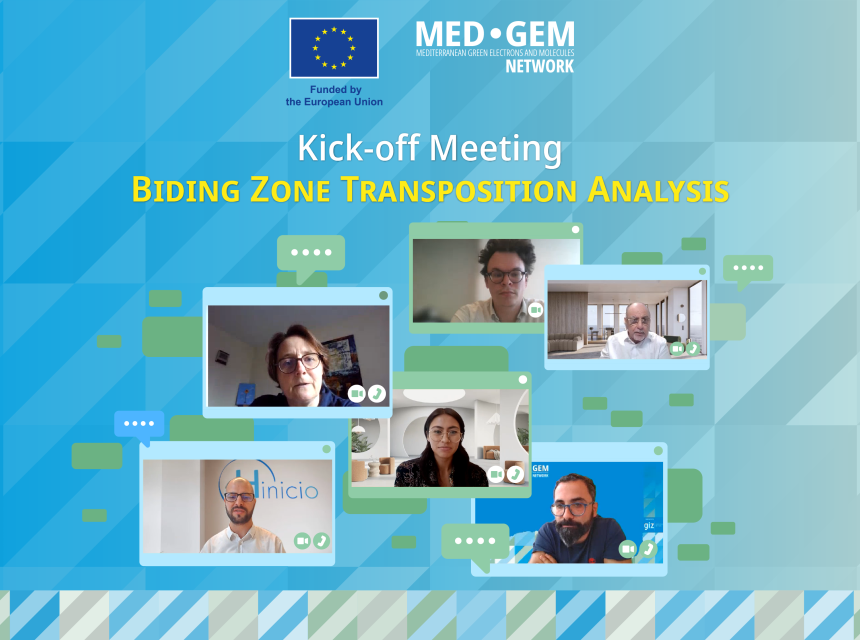MED-GEM Launches Strategic Pilot Study on Bidding Zones for Renewable Hydrogen Certification
MED-GEM Launches Strategic Pilot Study on Bidding Zones for Renewable Hydrogen Certification
26 May 2025 – In a pivotal step for advancing renewable hydrogen cooperation between the European Union and Southern Mediterranean Countries (SMCs), the MED-GEM Network launched the Bidding Zone Transposition Analysis for RFNBO Certification Readiness. This strategic pilot study, funded by the European Union, aims to assess whether the electricity systems in Algeria, Egypt, Jordan, Morocco, and Tunisia — as part of a pilot phase — can support compliance with EU RFNBO certification requirements, particularly regarding the concept of bidding zones and geographical correlation. Organised by the MED-GEM Network in collaboration with Hinicio and CertifHy, the high-level virtual meeting brought together national focal points, government institutions, transmission operators, and experts from DG ENER, DG MENA and Gulf, and the European Commission’s Delegation to the region.
Why Bidding Zones Matter for Green Hydrogen
To be eligible for export to the EU under RED II, RED III, and Delegated Regulation (EU) 2023/1184, RFNBOs must be produced with renewable electricity that meets strict conditions of geographical, temporal, and additionality correlation.
As explained by Rocío Marín Briceño, Project Manager at Hinicio, and Santiago Garcia Herreros, Project Director, the concept of bidding zones—geographical areas within which electricity can be traded freely without congestion—plays a key role in verifying geographical correlation. This is especially relevant when the electricity used for hydrogen production is sourced via the national grid.
“If we want to unlock the full export potential of green hydrogen from the region, it is important that national market configurations can be interpreted in ways compatible with the EU rules for certification,” noted Santiago Garcia Herreros.
Three-Phase Methodology to Enable Certification
The consulting team outlined a detailed three-phase approach to be implemented over 12 weeks:
- Stakeholder Engagement and Data Collection:
Individual workshops with each partner country will identify grid structures, regulatory definitions, energy generation mix, and market zones. National stakeholders such as TSOs, regulators and ministries will be invited to contribute key datasets and documentation. - Technical Assessment:
Based on the collected data, a country-specific evaluation will determine how electricity markets are currently organized, assess transmission capacity and constraints relevant to bidding zone application, and assess whether the concept of bidding zones can be meaningfully transposed. - Recommendations and Capacity Building:
Tailored guidance will be provided for each country on risk mitigation, pre-certification strategies and policy alignment. A capacity-building roadmap will also be proposed to strengthen institutional knowledge on RFNBO certification processes.
Keynotes from the European Commission and MED-GEM Network
Ruta Baltause, Policy Officer at DG ENER, opened the session with strong words of support:
“This assignment is critical to help partner countries translate EU rules into local realities. While electricity systems differ, engineering principles are universal—and our shared goal is to enable the clean hydrogen economy.”
Mustapha Taoumi, Deputy director at MED-GEM, underlined the strategic potential of the region:
“Southern Mediterranean countries have the land, the solar and wind resources, and the proximity to Europe. But ensuring system certification readiness under EU rules is essential to turn this potential into investable projects, in compliance with EU certification requirements”
Toufic Rizkallah, MED-GEM’s Regional Coordinator, moderated the meeting and emphasised the importance of data accessibility and stakeholder mobilisation in each country:
“Our national focal points will play a central role in coordinating the workshops and supporting engagement with utilities, TSOs and regulators.”
From the certification side, Matthieu Boisson, Managing Director of CertifHy, reinforced the EU’s ambition to create a globally harmonised certification framework:
“This study will help build a clear, robust baseline—opening the way for pre-certification and future recognition under EU schemes.”
Towards Regional Impact
The study aims to provide SMCs with:
- Clear guidance on how their electricity systems can align with EU RFNBO certification;
- Identification of bottlenecks and risks (e.g. data gaps, grid congestion);
- A pathway to facilitate project bankability for green hydrogen developers.
Importantly, the results will support a broader regional approach to green energy value chain integration between Europe and the Southern Neighbourhood. Insights from this pilot phase may also inform similar activities in other Southern Mediterranean countries in the future.
What’s Next?
From 27 May to 21 June 2025, Hinicio and MED-GEM will lead national stakeholder workshops in each partner country to collect data and validate assumptions. Focal points are already preparing the engagement of key stakeholders. Preliminary results are expected in late July 2025, including a certification readiness roadmap and policy recommendations.
A tailored capacity-building programme will also be proposed to support national authorities, energy planners, and regulators in applying certification-compatible adjustments.

